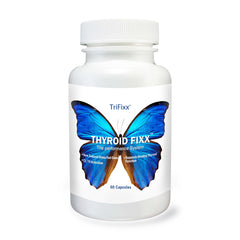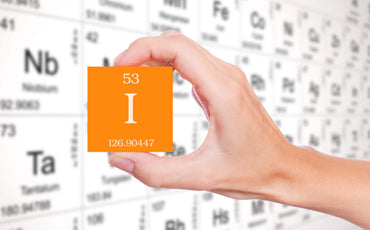
The thyroid gland is an essential organ in the body’s endocrine system, directly responsible for metabolism and organ development. The thyroid hormones are produced in short bursts and distributed to the target organs, where they affect the needed biological function. Thyroid problems arise primarily from impairments of the thyroid gland, causing an imbalance in the normal levels of the thyroid hormone. Thyroid problems can be a result of an overactive thyroid or underactive thyroid. Management of thyroid problems has shifted towards the integrative therapy approach, which combines conventional medicines with traditional therapy products and supplements. TriFixx™ is currently available as a reliable nutraceutical with proven efficacy in correcting thyroid hormonal imbalance and reversing thyroid dysfunction.
INTRODUCTION: General Thyroid Functioning
Currently, there are numerous medical reviews and anecdotal submissions focused on the biological importance and physiological functions of the thyroid gland. The thyroid gland, is a butterfly-shaped organ, located at the front of the neck just below Adam’s apple. In a healthy adult, this organ weighs about 40-60 grams on average. Composed of two different lobes completely enclosed in fibrous capsules, the organ is made chiefly of unit size lobules enveloped by thin layers of connective tissues. The lobular units contain follicular vesicles – small sacs – serving as the primary storage reservoirs for thyroid hormones produced in droplets by the organ.
Primarily, the thyroid gland plays focal roles in metabolism, growth cycle, and development of the human body. The hormones of the thyroid – thyroxine, calcitonin, and triiodothyronine - are released into the bloodstreams in steady short bursts where they are attached to transport proteins and eventually distributed to the necessary organs for use. Calcitonin is principally involved in calcium and bone metabolism. Thyroxine and triiodothyronine regulate the basal metabolic rate and indirectly raise body temperature, increase pulse, activate nervous coordination, and promote brain development in children.
Clinical Overview Of Thyroid Diseases
Optimal thyroid functioning is definitive is the scope and balanced clinically on a controlled production and release of the thyroid secretions into the organs through the bloodstream. Thyroid problems develop from an overactive thyroid or underactive thyroid.

Overactive Thyroid
An overactive thyroid occurs in cases of excess thyroid hormone production. Also referred to as ‘hyperthyroidism’, this condition unnecessarily speeds up the normal body functions and manifests as noticeable symptoms of increased metabolism. At the later stages of disease progression, people with hyperthyroidism present with a swollen thyroid, which becomes noticeably large in size with time. In some patients, a lump (nodule) may be felt on physical examination. The excess hormones in the blood are transported to the various organs of the body, where an abnormal surge in organ function is noticed.
Repeated bouts of episodic palpitations develop in the heart as the hormones cause an irregular heartbeat cycle in these patients. Most patients report a steady increase in blood pressure. These symptoms are particularly dangerous in old patients with underlying cardiovascular or endocrine diseases, as increased blood pressure can lead to end-organ damage. There is also a noticeable loss in weight, especially in patients with inadequate food intake. Paradoxically, these patients sometimes present with an increased appetite. Patients with hyperthyroidism commonly experience abnormal functioning of the sweat glands, leading to uncomfortable moments of excessive sweating. The skin develops a soft texture, and the hairline thins out. Other common symptoms include: unexplained fatigue, irritability, diarrhea, trembling, and general body weakness.
Underactive Thyroid
In underactive conditions of the thyroid gland, the thyroid hormones are under-produced, causing a deficiency in thyroid functioning. This is the most common form of thyroid problems. In primary hypothyroidism, the thyroid is impaired and unable to produce a sufficient amount of the thyroid hormones needed by the body system. Secondary hypothyroidism is, however, linked directly to inadequate secretion of thyroid-stimulating hormone (TSH).
In developing parts of the world, deficiency of dietary iodine is considered the foremost cause of hypothyroidism. The incidence of hypothyroidism in newborns is increasing at a slow pace, with 1 in every 4000 newborns confirmed to have this condition. However, congenital hypothyroidism is the most diagnosed variant of underactive thyroid in newborns. Low levels of vitamin D have also been linked with different variants of underactive thyroid. Women are more likely to develop hypothyroidism; however, the symptoms of this condition occur in all patients with no regards to sex or age distribution.
Clinical manifestation of hypothyroidism can range from asymptomatic, through to severe symptom presentation. With a low secretion of thyroid hormones, metabolism slows, and the body functions become impaired. Adult patients experience lethargy and a persistent cold sensation. Patients may also become depressed and forgetful. Generally, patients present with a depressed mood and a low quality of life. Female patients experience irregularities in menstrual cycles and fertility problems in severe cases.
Popular Diagnosis Approach
Thyroid dysfunctions are clinically diagnosed by symptom assessment and thyroid function tests. Sometimes, it is necessary to differentiate between the different variants of thyroid problems and evaluate thyroid functioning for a proper treatment module to be designed. Thyroid function tests assess the levels of circulating thyroid hormones and thyroid-stimulating hormone (TSH) in the body system. Blood tests are considered an inaccurate approach to thyroid function assessment, as only 18% of the body’s thyroid hormones are located in the blood. The Thyroflex™ test has been proven to give a comprehensive evaluation of thyroid functioning. This test evaluates thyroid health by measuring the rate of reflex conduction through the muscles. The Thyroflex™ test is an innovative approach that combines reflex conduction with Resting Metabolic Rate (RMR) and the nature of symptom presentation.
Management Of Thyroid Problems With TriFixx™
The management of thyroid dysfunction with nutraceuticals is a fast emerging practice within the medical community. Nutraceuticals are considered an excellent alternative to conventional medicine in endocrine dysfunction management. These products have little to no adverse effects and are readily available in flexible dosage forms offering integrative therapy to various demographic distributions across the human population.
The TriFixx™ nutraceutical line is available as a non-prescription product range, offering a reliable treatment for correcting thyroid hormonal imbalances and dysfunctions. Included in this range, is Thyroid Fixx™ to support the T3 and T4 hormones, D3/K2 Fixx™ to open up the receptor pathways and iodine/iodide with selenium to convert the T3/T4 into a usable form, through Iodine Fixx™. The Tri-Thyroid Fixx™ plan improves thyroid hormone levels by correcting abnormal cycles of thyroid hormone secretion. This trio also stabilizes the levels of thyroid-stimulating hormone (TSH) and directly corrects thyroid dysfunction caused by a secondary cause. With TriFixx™, therapy outcomes are determined with the evaluation of symptom improvement and the patients’ quality of life.
REFERENCES















